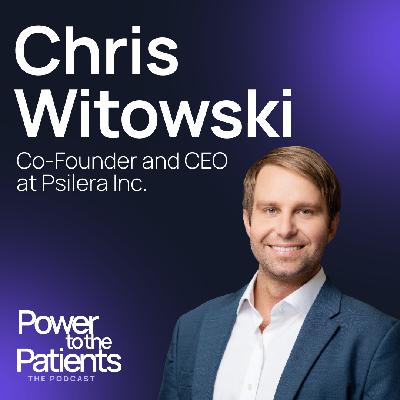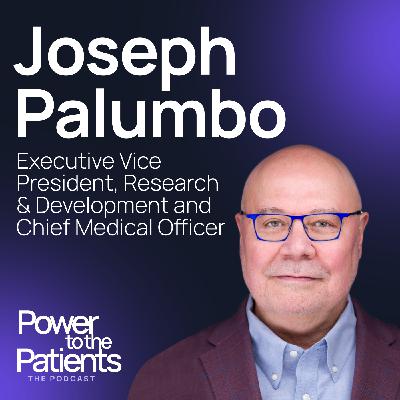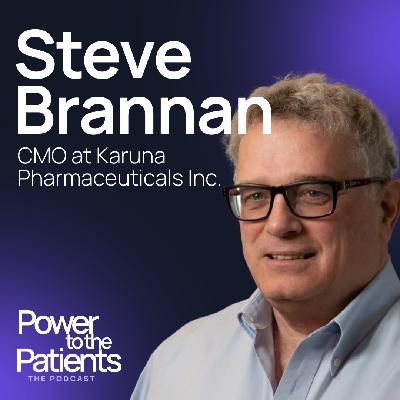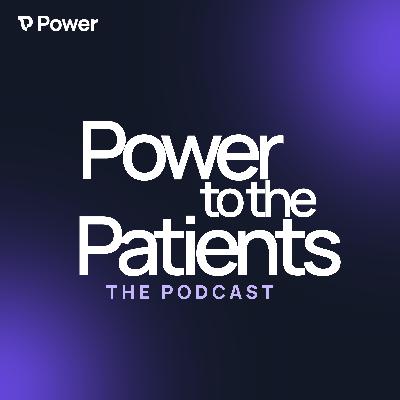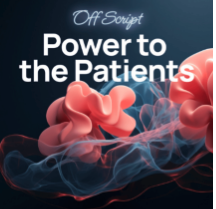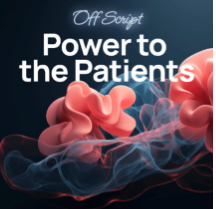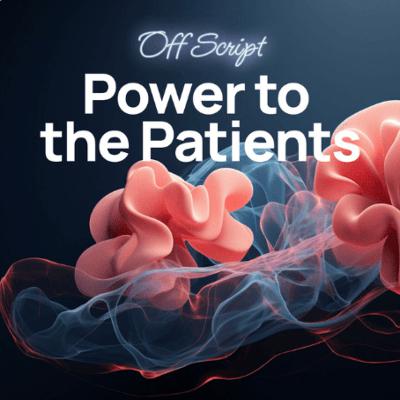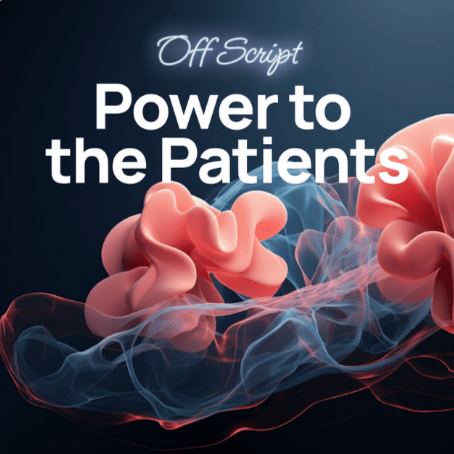Discover Power to the Patients
Power to the Patients

Power to the Patients
Author: Brandon Li
Subscribed: 1Played: 0Subscribe
Share
© 315762
Description
Power to the Patients is a LinkedIn Live and podcast series hosted by Power where clinical research leaders across sponsors, sites, CROs, and patient advocacy groups discuss patient centricity in clinical trials. We explore the bottlenecks in today's systems, challenge the status quo and talk about future opportunities for innovation.
Looking for a clinical trial? Visit us at www.withpower.com
Looking for a clinical trial? Visit us at www.withpower.com
48 Episodes
Reverse
In this episode of Power to the Patients, host Brandon Li sits down with Dr. Lara Shirikjian, Medical Director at CenExel, to explore why operational excellence, not just innovation, drives progress in psychiatric drug development. Drawing on more than two decades of experience in schizophrenia and CNS research, Dr. Shirikjian explains how protocol mastery, direct sponsor communication, and community trust are essential to running high-performing research sites and advancing meaningful psychiatric treatments.
In this episode of Power to the Patients, Brandon Li and Sonia Prashar, Founder and CEO of AIM Trials, sit down to discuss how hybrid and decentralized clinical trial models are reshaping mental health research. Sonia shares how her personal experience with postpartum depression inspired a mission to reduce patient burden, expand access, and improve data quality, while challenging stigma and outdated research assumptions along the way.
In this episode of Power to the Patients, Brandon Li sits down with Dr. Craig Erickson, Research Director and Research Endowed Professor at Cincinnati Children’s, to explore how synaptic restoration is revolutionizing treatment for Fragile X, autism, ALS, Alzheimer's, and schizophrenia. From his decades of clinical experience and pioneering work at Spinogenix, Dr. Erickson shares the science behind restoring brain connectivity, the bold early results that surprised even experts, and why this approach could transform outcomes for patients with devastating neurological disorders.
In this episode of Power to the Patients, Brandon Li sits down with Dr. Laxminarayan Bhat, Founder and CEO of Reviva Pharmaceuticals, to explore groundbreaking developments in schizophrenia treatment. Dr. Bhat shares insights on his company's innovative drug that shows promising results with fewer side effects and better patient adherence than existing treatments. Discover how their unique approach to targeting serotonin-dopamine signaling, combined with reduced off-target effects, could transform the lives of millions living with schizophrenia. Learn about the challenges and triumphs of developing psychiatric medications, the role of biomarkers in treatment, and the future of precision psychiatry.
In this episode of Power to the Patients, Brandon Li sits down with Dr. Gabriel Vargas, Chief Medical Officer at CuraSen Therapeutics, to explore how targeting the adrenergic system could offer both symptomatic relief and disease-modifying potential for Alzheimer's, Parkinson's, and depression. From his two decades developing breakthrough therapies in neurology and psychiatry, including the migraine treatment Erenumab, Dr. Vargas breaks down translational medicine, challenges the amyloid hypothesis, and reveals why shorter clinical trials may be missing the bigger picture.
What if inflammation was the key to unlocking treatments for Alzheimer's, Parkinson's, and Long COVID? In this episode of Power to the Patients, Brandon Li sits down with Cuong Do, CEO of BioVie, to explore the fascinating intersection of these seemingly unrelated conditions. From diving into medical research at the age of 14 to leading groundbreaking clinical trials, Cuong shares invaluable insights on biotech innovation, trial design, and navigating today's challenging funding landscape. Tune in to discover how a single molecule's unique ability to cross the blood-brain barrier could potentially transform treatment for millions of patients.
In this episode of Power to the Patients, Brandon Li sits down with Dr. Chris Witowski, CEO and Co-Founder of Psilera, to explore the fascinating intersection of psychedelics and neurodegeneration. Discover how non-hallucinogenic compounds could revolutionize treatments for conditions like frontotemporal dementia, why traditional psychedelics may have overlooked neurodegenerative applications, and the future of neuroplasticity-based therapies. From biomarker development to innovative drug delivery systems, this conversation offers deep insights into an emerging frontier in neuroscience that could transform patient care beyond traditional psychiatric applications.
In this episode of Power to the Patients, Brandon Li and Dr. Palumbo, Chief Medical Officer at BioVie Pharma, explore the evolving landscape of neuroscience research, the critical differences between big pharma and biotech approaches, and promising new pathways for treating conditions like Parkinson's and Alzheimer's. Whether you're a researcher, clinician, or industry professional, this conversation offers a fascinating look at how inflammation-focused treatments and systems biology could revolutionize neurological disease treatment.
What if you could learn the secrets behind one of psychiatry's most significant breakthroughs in decades? In this episode of Power to the Patients, host Brandon Li sits down with Steve Brannan, Chief Medical Officer of Karuna Therapeutics, to explore the art of clinical trial excellence, the future of precision psychiatry, and the untold story behind developing the first new-mechanism schizophrenia drug in decades. Whether you're a researcher, clinician, or industry professional, this conversation reveals invaluable insights about trial methodology, site relationships, and the delicate balance between speed and quality in drug development. Tune in to discover why clinical operations excellence might be the most underappreciated factor in successful psychiatric drug development.
In this episode of Power to the Patients, Brandon Li speaks with Dr. Anantha Shekhar, Senior Vice Chancellor for Health Sciences and Dean of the School of Medicine at the University of Pittsburgh. Dr. Shekhar shares how his early experiences with a family member’s schizophrenia inspired a lifelong mission to bridge neuroscience, psychiatry, and translational research. They explore how psychiatry and neurology are rapidly converging, why the future of mental health treatment lies in understanding brain circuits and plasticity, and what AI, precision medicine, and synthetic biology might mean for the next generation of therapies. Dr. Shekhar also reflects on his pioneering work developing xanomeline—the first novel mechanism of action for schizophrenia in over 70 years—and offers hard-won lessons on trial design, translational gaps, and maintaining scientific rigor in a complex field. A fascinating conversation on the science—and the humanity—behind reshaping how we understand and treat the brain.
In this episode of Power to the Patients, Brandon Li speaks with Ram Mukunda, CEO of IGC, about groundbreaking approaches to Alzheimer’s care. Ram shares how his team is developing an ultra-low dose THC-based therapy to reduce agitation and neuroinflammation without sedation, and how AI models may transform early diagnosis for millions worldwide. Their conversation highlights both the science and the human urgency behind innovating for patients and caregivers facing Alzheimer’s.
What if we could treat severe depression in just five days — and give patients back the cognitive control to live their true lives? This week on Power to the Patients, we sit down with Brandon Bentzley, MD, PhD, co-founder and Chief Scientific Officer at Magnus Medical, to talk about the future of precision psychiatry and the breakthrough SAINT™ protocol.
What does great clinical operations really look like? In this episode, Sarah MacCallum and Melissa Gaines of Annovis Bio share their journeys into clinops and the lessons they’ve learned leading Alzheimer’s and neurology trials. From choosing the right site partners to keeping engagement high, to navigating the unique challenges of working with vulnerable populations, they break down what it takes to run trials that truly make an impact.
With over 25 years of experience building and investing in CNS companies, Daniel shares the story of why he placed a big bet on Acumen — from its origins as a seed-stage idea to today’s phase 2 clinical trial, Altitude AD. He explains the science behind targeting amyloid beta oligomers (rather than plaques), what makes Alzheimer’s research uniquely difficult, and why recent advances in biomarkers, trial design, and patient recruitment give him hope for meaningful progress.
In this episode, Brandon sits down with Dr. Michael Gold, Chief R&D Officer at Compass Pathways, to explore the art and science of running high-quality clinical trials. With nearly 30 years of experience across pharma giants like J&J and GSK, as well as small biotechs, Mike shares a masterclass on clinical operations—why the best study design means nothing without flawless execution, and how quality must always come before speed or cost.
Brandon Li talks with Matt Leoni—former Senior VP of Global Clinical Development at Cerevel and now Chief Medical Officer at Merida Biosciences. Matt shares his journey from medical school to leading late-stage drug development in neuroscience. He discusses the unique challenges of neuro drug development, from the subjectivity of endpoints and high placebo response rates to the operational hurdles of large-scale trials. Matt offers candid insights into why promising drugs sometimes fail, the limitations of current measures, and where innovation is most needed. The conversation explores disease-modifying therapies, advances in Parkinson’s and schizophrenia research, the promise and pitfalls of psychedelics and psychoplastogens, and his vision for a more risk-tolerant industry that fosters breakthrough discoveries.
Brandon Li talks with Dr. Gerard Sanacora, Professor of Psychiatry at Yale, about his journey from molecular physiology to pioneering research on GABA, glutamate, and rapid-acting antidepressants. Gerard shares how a surprising finding in patients undergoing ECT redirected his research toward depression—and eventually to ketamine. Their conversation explores the science of neuroplasticity, the complexities behind ketamine’s mechanism of action, and how interventional psychiatry and digital tools may shape the future of mental health care.
Dina Burkitbayeva, CEO of Freedom Biosciences, shares how she launched one of the first venture funds focused on mental health innovation. After co-founding PsyMed Ventures, she partnered with Dr. John Krystal to advance a more durable version of ketamine for treatment-resistant depression. She discusses the rise of interventional psychiatry, the limitations of current antidepressants, and the evolving clinical landscape for next-gen therapeutics. A powerful look at what it takes to bring meaningful change to mental health treatment.
Brandon Li talks with Joel Raskin, Chief Medical Officer at Arrivo, about his journey from training in psychiatry in Toronto to leading pharmaceutical research in his current role. Joel shares details on SP-624, an Arrivo compound showing promise in treating depression through epigenetic mechanisms. Their deep dive covers the challenges of clinical trials, and the potential for precision psychiatry to revolutionize psychiatry and neuroscience.
In this episode, Dr. Jerry Rosenbaum and Dr. Sharmin Ghaznavi offer a rare look into academia’s role in the psychedelic renaissance, tracing the origins of Mass General’s Center for the Neuroscience of Psychedelics. They discuss how their shared interest in rumination—and its role in treatment-resistant mental illness—led them to explore psilocybin’s effects on brain connectivity. The conversation spans everything from neuroplasticity and default mode networks to the challenges of securing funding, the limits of industry-driven research, and what’s next in training the next generation of psychiatrists. It’s an honest, far-reaching discussion about where the science stands—and where it still needs to go.








